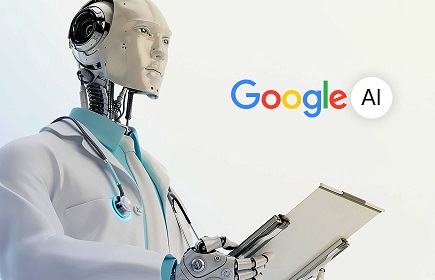
28 Jan Google AI: My two-word takeaway from JP Morgan Week
Attending JP Morgan Week is like being caught in a blizzard – a blizzard of information, connections, and impressions. With literally hundreds of concurrent presentations and meetups, and scores of receptions – all compressed into four long days, the intellectual bombardment is nearly overwhelming. So as the final session I attended concluded, last Wednesday afternoon, I reflected on which sessions made not only the greatest impact in the moment, but what technologies truly are going to be the game changers, and dramatically improve healthcare. And it hit me: AI. Not artificial intelligence, but augmented intelligence.
The person who presented the most compelling case for AI-enabled “cognitive amplification” – particularly when coupled with the capabilities of natural language processing and connected devices, was John D. Halamka, MD, President of Mayo Clinic Platform. Halamka was recruited away from his posts in Boston, as Executive Director of the Health Technology Exploration Center for Beth Israel Lahey Health, and as Harvard’s International Healthcare Innovation Professor. And, for years, he’s been searching out innovative new healthcare applications around the world – and still made time to be an ED doc. Now, as the health IT evangelist leads digital health strategy – as an amalgam of technology, policies, people, and partnerships with other companies, he plans to create an “innovation factory” for collaboration. It’s also clear that Halamka considers Google, as the infrastructure provider, to be the foundation of the Mayo Clinic Platform.
The first Platform project, announced at JP Morgan, is a partnership with nference, a data analytics company that will collate and digitize 25 million of Mayo’s pathology slides along with millions of annotated physician notes, creating the largest source of labeled, and searchable, medical data in the world. The resulting Clinical Data Analytics Platform will work to identify new targets for treatments, as well as to develop new diagnostic methods of matching patients with different therapy regimens.
As Halamka explained, with access to millions of patient medical records, the goal is that any of Mayo’s physicians will be able to zero in on the de-identified patients in this massive, searchable database, selecting which patients’ diagnoses – and other attributes – most closely match those of the patient sitting in front of them. Then, zero-in on which therapeutic regimen worked best to treat the disease of these patients in the past, and would most likely work best for their current patient. This use of augmented intelligence should enable the Mayo Clinic’s famed diagnosticians to preserve their top spot among U.S. News’ ranked hospitals.
Earlier in the Week, at the StartUp Health Festival, Dr. David Feinberg (formerly CEO of both UCLA Health and Geisinger), and now VP of Google Health, was interviewed on the topic of patient privacy. Ever since The Wall Street Journal broke the story about Google’s “Project Nightingale” having access to 50 million of Ascension Health’s identified patient records, ensuring patient privacy has become an even hotter topic. Feinberg was obviously annoyed at the brouhaha the Journal article stimulated, and insisted that “We developed this on de-identified data … It wasn’t in secret.” However, he did conclude, “If you don’t trust us and we can’t bring [innovation] in a way that actually makes it easier, that’s comprehensible, that’s affordable, that’s dignified, that’s culturally sensitive … then I don’t care how good the AI is. It’s not going to work.”
Fortunately, at Mayo Clinic Platform, they’ve already announced they’ll only be storing patient data on Google’s Cloud that has nearly two dozen patient identifiers already stripped away from it.
by Mimi Grant, President, Adaptive Business Leaders (ABL) Organization – Round Tables and Events for CEOs of Technology and Healthcare Companies

